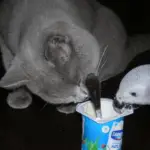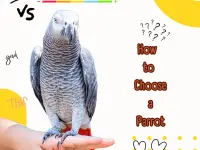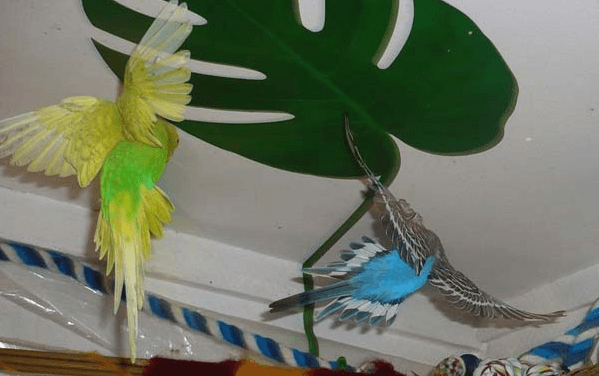
Are you sure you know your parakeets well?
Although small, our budgerigars are part of the order Psittaciformes, just like our large parrots. This is why they also have the same needs: a complete and adapted diet, a spacious and continuously enriched environment, appropriate care and attention, and a lot of attention.
Small parakeets turn out to be hardy species, with high adaptability and easy to reproduce. Add to that their resplendent colors and you will understand why they are so popular in our interiors.
They adapt without problems to the conditions of life in captivity and seem to be able to reproduce easily even if they have only a minimum of resources; which does not mean, however, that they have the necessary resources for their development! We must not be content to offer them only the minimum subsistence and be deceived by this high adaptability which will hide their discomfort.
On the contrary, it is necessary to optimize their living conditions. We will therefore discuss the various essential points to work on to improve their daily lives,
Improve the daily life of budgerigars
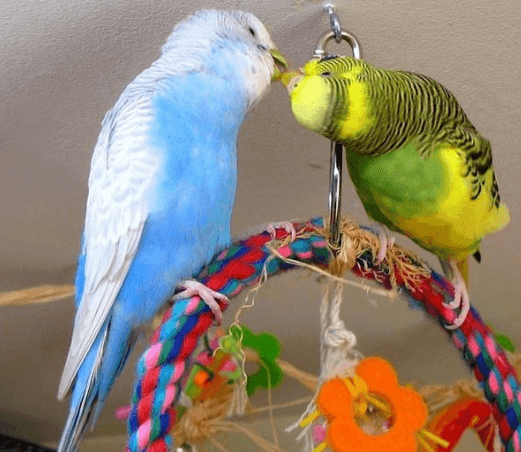
The need for congeners
Parakeets are gregarious species, so they absolutely need company and social interaction under the pain of behavioral disturbances and a certain social lethargy. A parakeet should never be detained alone if its human is not continuously available; it must be at least in a couple, at best in a small group.
Observe how your parakeets are more cheerful, dynamic, and productive in groups. You will be able to notice behaviors of altruism, empathy, cooperation, and reciprocity, but also behaviors of deception… All this depends on their intellectual and emotional faculties.
A spacious and enriched environment
The cage is the most common place where parakeets live, but it should never be. Just because they’re small doesn’t mean they have less need for environmental stimuli. It comes from their natural behavior, from their genetic makeup. A budgie can regularly travel tens of kilometers a day in the wild: you will better understand why a 50 cm ( 20 inches ) long cage can make them aggressive and territorial when they live together.
Improve the daily life of budgerigars
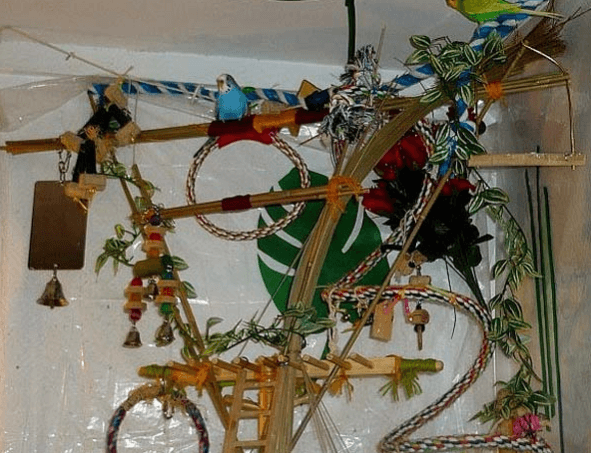
For a solitary parakeet, this prison cage will make it listless and depressed. The cage must be spacious, wide, and long; the round cage is to be avoided. But the most important thing is that your parakeets can access a play park where no bars will limit and inhibit their natural behavior.
They must be able to go out into their living room every day, and this for several hours, which will often be yours too! They need space to fly to maintain a healthy and athletic body. In addition, it allows them to play, chomp through the various hard and softwoods and fresh branches available to them, groom themselves, bathe and finally search for and work for their food.
This is called the enrichment of their environment, which is essential to them. Never settle for a perch and simple feeding bowls. There must always be toys, different materials, blocks of iodines, and cuttlefish bones to chew on, for their beaks and their health. Small aside, do not give them access to anise sand (grit or gravel ) which may clog their crop and is unsuitable for their needs.
Finally, make sure that their living room is secure: dangerous objects must be isolated, the openings where they may get stuck must be plugged and poisonous plants removed.
The parakeet’s environment is its daily living environment. It is essential that it be calm, secure, protected from drafts, constant in its temperatures, and bright. This is essential for the parakeet’s metabolism and for the strength and beauty of its plumage.
If your parakeets do not have access to natural light (sun) install a full spectrum artificial light reproducing the necessary Parrot UV. And above all, hygiene must be irreproachable: it is a capital element for the health, well-being, and life expectancy of your parakeets. Hygiene is the key to the longevity of your parakeet because cleaning and disinfecting its environment helps prevent common and fatal infections and pathologies.
An adapted and complete diet
The Parrot diet and Parakeets primarily feed on a seed mixture that is suitable for the species concerned. But that’s not enough. The seeds eaten in their natural state are semi-ripe and complemented by their fresh greenery. This is why we must favor germinations in the diet of our parakeets.
These provide vitamins, minerals, and trace elements; they, therefore, avoid deficiencies and fatty liver. It is then necessary to offer daily fruits, greens, and fresh vegetables ( chickweed, dandelion, wild millet, plantain ), essential for their good development and their parakeet vitamin intake ( especially vitamin A).).
This is what allows them good immune defense and the development of plumage. Then, they need egg food, essential during the molting and reproduction periods; this prevents our birds from drawing on their reserves, being emptied of energy, and becoming fragile. Finally, calcium ( cuttlefish bone ), as well as an iodine block ( parrakeet goiter), are essential for them, in addition to vitamin and mineral blocks for their beak and their body.
Improve the daily life of budgerigars
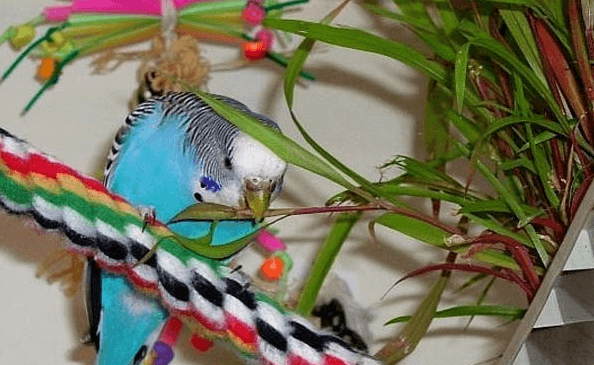
The time to devote to it and the activities
How to socialize a parakeet? After these previous essential points, there is still an important and personally interesting point to review: the relationship you have with your parakeets. Is it a thoughtful cohabitation in which they remain untamed but socialized and autonomous in their environment? Is it a relationship of familiarity and contact with humans? Or, is it a relationship of a parakeet imbued with humans? The need for attention, games, and moments with his human will depend on the initial relationship.
A tame bird will need attention and interaction with the humans in the house. However, an Imbued Parakeet will need even more attention and demands. It will be necessary to know how to listen to and respect these needs.) will require a lot of interactions, activities with its human, cuddly moments, and games to occupy its days.
As for your parakeets that are not tamed, if you learn the right way to go about it and if you take the time to work with them every day, thanks to the reinforcements, you will quickly achieve results. Never lose patience and you will see their capabilities.
10 TIPS How to make your Budgie LIVE LONGER!
SOURCE:Budgie World
Conclusion
Once the environment, food, and social needs of your parakeets have been reworked and improved, you will rediscover happy, dynamic, joyful, and above all more pleasant birds. You will see less aggressive yelling and behavior. Your parakeets will be more confident, less anxious, and less territorial. But above all, you will observe an improvement in exchanges between members of the same species as well as interactions with humans.
Improve the daily life of budgerigars
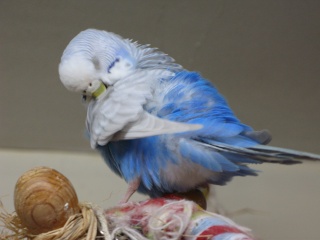
Your parakeets have real intellectual and emotional capacities. They experience joy, excitement, attachment, and friendship, but also anger, pain, and fear. This is why they deserve that their needs be respected because no human would want to be subjected to what we are sometimes capable of inflicting on them for lack of information.
Finally, I will share with you two touching anecdotes that will illustrate the abilities of your parakeets. The first is the story of a budgie with wing feathers cut in a pet shop, who was seen falling to the ground during an outing and could have been injured.
A congener quickly came down to join her and repeatedly showed her how to climb and descend the ladder in order to join the rest of the group. This selfless parakeet had no personal interest in going down and patiently teaching the new kid how to climb the ladder.
The second also illustrates the behavior of mutual aid, like the time when my parakeet started to scream all she could to alert me that another of my parakeets was hanging himself, strangled by a wire. , by dint of struggling.
Your parakeets can also tell you about a communication malfunction. For example, do not leave the day without warning, or you might see your parakeet expressing its displeasure when you return… She makes you the sound of a kiss and asks you to come by being happy and calling you. Moved you present your face to him and receive a nasty peck at the last moment!
It is enough to know the codes of communication of your parakeets as well as to make efforts to set up an environment adapted to their needs, to find yourself with a true relationship of trust. Do not neglect their needs or their capacities, they too have the right to exist and to develop fully!

